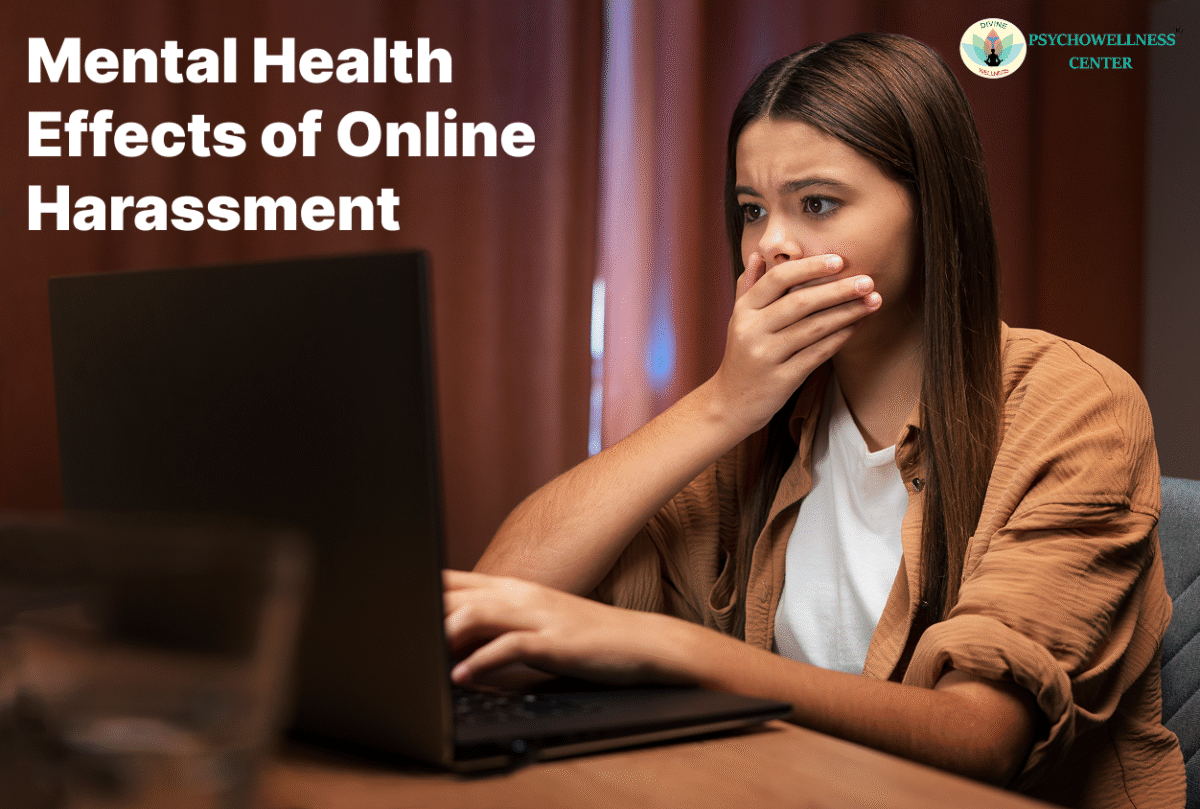In our increasingly digital world, online harassment has become a pervasive issue that affects individuals across various demographics. From social media platforms to online gaming communities, the anonymity of the internet can lead to harmful behaviours that have significant mental health consequences. This blog explores the mental health effects of online harassment, its prevalence, and strategies for coping and recovery.
Understanding Online Harassment
Online harassment encompasses a range of behaviours aimed at intimidating, threatening, or humiliating individuals through digital platforms. This can include cyberbullying, doxxing (publishing private information), trolling, and hate speech. The anonymity afforded by the internet often emboldens individuals to engage in behaviours they might avoid in face-to-face interactions.
Mental Health Effects of Online Harassment
The mental health effects of online harassment can vary based on individual resilience, the severity of the harassment, and the support systems in place. Common effects include:
- Anxiety and Depression: Experiencing online harassment can lead to increased levels of anxiety and depression. Victims may constantly worry about their safety or feel hopeless about their situation. The emotional toll can manifest in symptoms such as persistent sadness, irritability, and difficulty concentrating.
- Low Self-Esteem: Online harassment can severely impact an individual’s self-esteem. Constant negative feedback, insults, or threats can lead victims to internalize these messages, resulting in feelings of worthlessness and self-doubt. This low self-esteem can hinder personal, social, and professional development.
- Isolation: Victims of online harassment may withdraw from social interactions both online and offline. Fear of further victimisation can lead to social isolation, making it difficult for individuals to seek help or connect with supportive communities. This withdrawal can exacerbate feelings of loneliness and despair.
- Post-Traumatic Stress Disorder (PTSD): In severe cases, individuals may develop symptoms of PTSD following online harassment. This can include flashbacks, nightmares, and heightened stress & anxiety. The trauma associated with harassment can linger long after the incidents occur, affecting daily functioning.
- Sleep Disturbances: The stress and anxiety from online harassment can disrupt sleep patterns. Victims may experience insomnia, nightmares, or restless sleep, further impacting their mental health and overall well-being. Poor sleep can also contribute to cognitive difficulties and emotional instability.
- Substance Abuse: In some cases, individuals may turn to substances as a coping mechanism for dealing with the emotional pain caused by online harassment. This unhealthy coping strategy can lead to addiction and exacerbate existing mental health issues.
Coping Strategies for Victims
Coping with the effects of online harassment is crucial for mental health recovery. Here are some strategies that can help:
- Seek Support: Reaching out for support from friends, family, or mental health professionals can provide a network of understanding and encouragement. Talking about experiences can help alleviate feelings of isolation and validate emotions.
- Document the Harassment: Keeping a record of incidents can be helpful for both personal reflection and potential reporting. Documenting harassment can provide clear evidence if the situation escalates and legal action becomes necessary.
- Limit Exposure: Consider taking breaks from social media or limiting time spent online. Reducing exposure to toxic environments can help alleviate stress and anxiety. Curating your online space to follow positive and supportive accounts can also improve your experience.
- Practice Self-Care: Engaging in self-care activities is essential for mental well-being. This can include exercise, meditation, hobbies, or spending time in nature. Prioritizing self-care helps to build resilience and improve emotional health.
- Consider Professional Help: If the effects of online harassment become overwhelming, seeking professional help from a therapist or counsellor can be beneficial. Mental health professionals can provide coping strategies, support, and a safe space to explore emotions and experiences.
- Know Your Rights: Familiarise yourself with your rights regarding online harassment. Many platforms have policies in place to address harassment and bullying. Reporting incidents can lead to action against the perpetrators and create a safer online space.
Conclusion
Online harassment poses significant mental health risks that can affect individuals profoundly. Understanding its effects and implementing coping strategies can aid recovery and resilience. As we navigate the digital landscape, fostering supportive online communities and advocating for respectful interactions can help mitigate the impact of harassment.
For young individuals struggling with stress, anxiety, or emotional imbalances resulting from online harassment, the Psychowellness Center, located in Dwarka Sector-17 and Janakpuri, New Delhi (011-47039812 / 7827208707), offers professional counselling, youth therapy, and emotional wellness programs designed to strengthen coping skills and enhance mental resilience. Their team, which includes some of the best psychologists near me, uses evidence-based approaches such as CBT, REBT, and Mindfulness-Based Therapy to help young people develop clarity, confidence, and emotional balance. TalktoAngel offers easily accessible virtual counseling and strength-based therapy for convenient online sessions to help young people develop positive attitudes and healthy behaviors in everyday life.
Together, we can work toward creating a safer, more inclusive online environment that prioritises mental health and well-being. If you or someone you know is struggling with the effects of online harassment, remember that support is available, and you are not alone in this journey.
Contribution: Dr. R.K. Suri, Clinical Psychologist, and Ms. Swati Yadav, Counselling Psychologist
References
- American Psychological Association. (n.d.). Cyberbullying: An emotional problem. https://www.apa.org/topics/bullying/cyberbullying
National Center for PTSD. (n.d.). PTSD and online harassment. U.S. Department of Veterans Affairs. https://www.ptsd.va.gov/
- Pew Research Center. (2021). Online harassment 2021. https://www.pewresearch.org/internet/2021/01/13/online-harassment-2021/
- https://www.psychowellnesscenter.com/Blog/impact-of-verbal-abuse-on-personal-identity-and-confidence/

